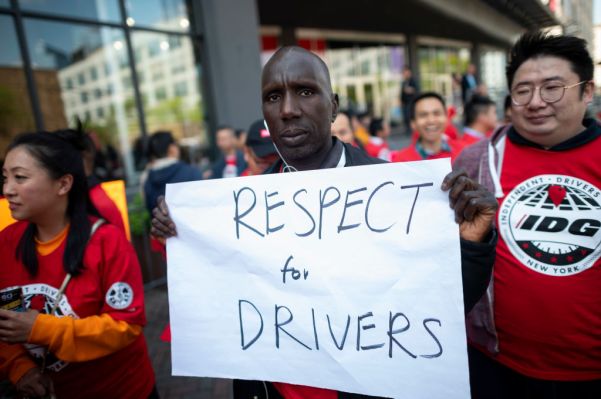A year ago, a Massachusetts court ruled to throw out a 2022 proposed ballot measure that sought to define gig workers as independent contractors rather than employees. Now it appears that proposal is getting a second wind.
The state’s attorney general, Andrea Campbell, on Wednesday approved backers of the ballot measure to begin collecting the tens of thousands of signatures for the measure to appear on the November 2024 ballot after certifying the questions met constitutional requirements.
Campbell also greenlit a competing ballot initiative from the union SEIU Local 32BJ that would allow drivers to unionize and bargain collectively for better working conditions and compensation.
The dueling proposals encapsulate the crux of the gig worker question. The app-based gig companies supporting the ballot initiative to keep gig workers as independent contractors argue that such a classification will enable the workers to maintain the flexible work schedules they value. Labor rights activists backing the union proposal argue companies have been failing to provide proper worker protections and benefits like workers’ compensation or even a basic human wage. One 2021 study found workers in Massachusetts could earn $4.82 per hour if the previous ballot measure passed.
The proposal filed in August by Flexibility and Benefits for Massachusetts Drivers 2024 — a group backed by Uber, Lyft and DoorDash — that would classify gig workers as contractors is similar to a ballot proposal that passed in California in 2020 called Proposition 22. It would establish an earnings floor equal to 120% of the state’s minimum wage for app-based drivers, or $18 an hour in 2023 before tips. Drivers would also get healthcare stipends, occupational accident insurance and paid sick time, although experts and drivers in California who have spoken to TechCrunch say it’s difficult, if not impossible, to qualify for those benefits.
The way app-based companies define hourly rates is also a subject of contention — they count only the hours a worker is actively pursuing a gig, like driving to a pickup and dropping off a passenger, as billable hours. This means the hours workers spend waiting for a gig go unpaid.
Ride-hail and delivery work can be dangerous as well. Drivers have complained about being robbed and assaulted, and some have been killed on the job, and they often get no recourse or compensation from companies like Uber, Lyft and DoorDash.
“We’re pleased that the attorney general’s office has certified our ballot proposals to ensure drivers can maintain the flexibility to work when, how often, and for how long they want as independent contractors, while also accessing new benefits and protections,” Conor Yunits, a spokesperson for Flexibility and Benefits for Massachusetts Drivers, said in a statement.
The proposal mirrors a similar one that was thrown out by the Massachusetts Supreme Judicial Court in 2022, after previous attorney general Maura Healey had similarly approved the initiative for signature collection. The court found that the ballot initiative violated state law and was therefore ineligible to put to voters.
At the time, Justice Scott Kafker said the coalition included a vaguely worded, unrelated proposal to limit companies’ liability for accidents by their drivers.
The industry-backed initiative may face similar challenges making it to the ballot, but it also has the potential to save Uber and Lyft from a lawsuit. Campbell’s office is scheduled in May to take the companies to trial over claims that they have misclassified their drivers as contractors.
In California, Prop 22 brought this issue into sharp focus on a national stage three years go. A California judge ruled in 2021 that the measure violated the state’s constitution, but a state appeals court in March upheld the measure.
